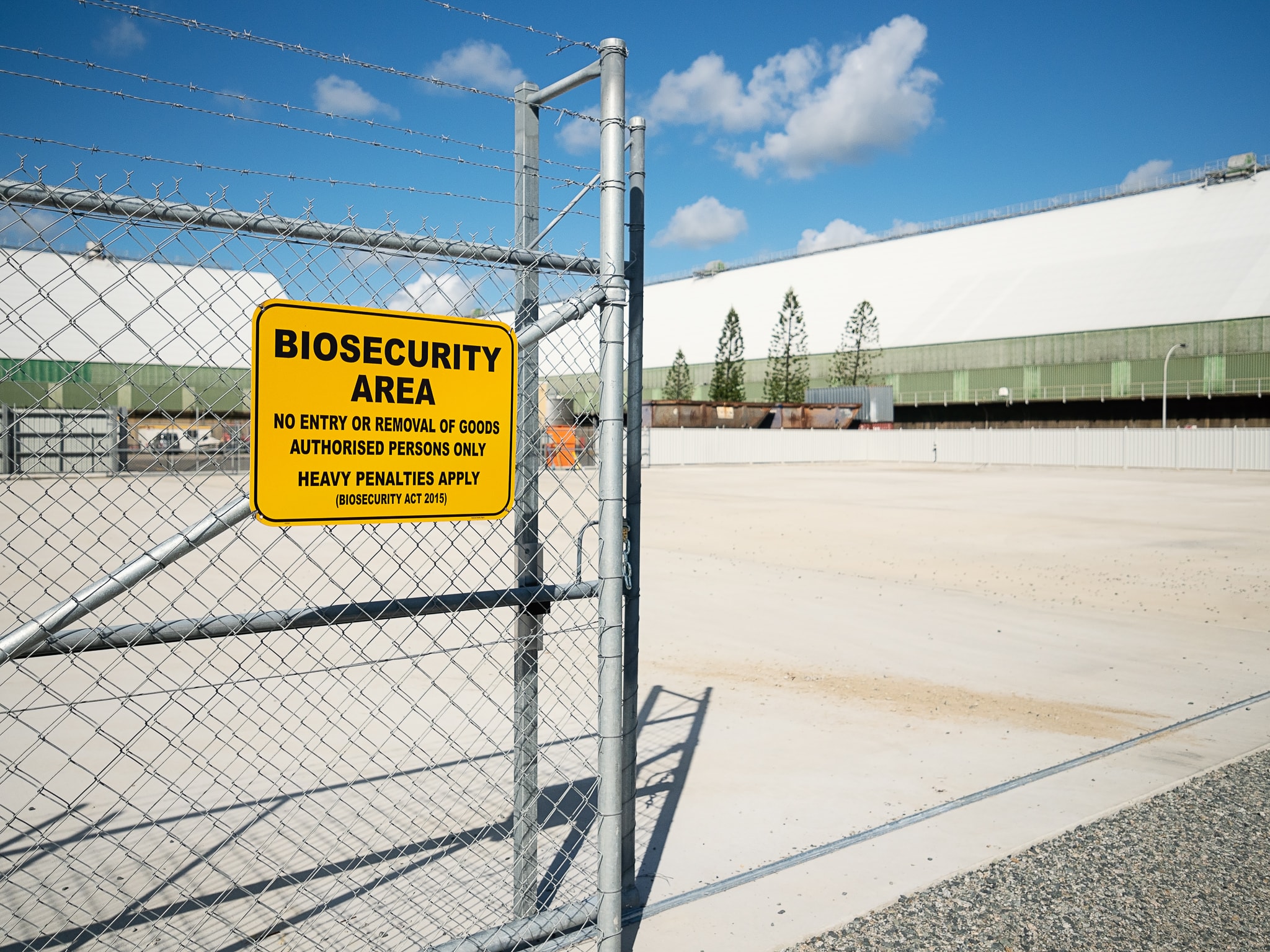Measures and monitoring
Protecting Australia’s biosecurity is a responsibility shared by government, industry and the community. We have facilities and monitoring activities in place to assist pest and disease biosecurity measures in Australia.
Additional to the monitoring programs below, we also proactively contribute to annual aerial feral pig control at Abbot Point and fox control at Port of Mackay and Port of Hay Point in partnership with the relevant local governments.This is under our General Biosecurity Obligation under the Biosecurity Act 2014.
The Port of Mackay has two wash bays operated by Northern Stevedoring Services (NSS), under approval from the Department of Agriculture, Water and the Environment:
- a 15m x 17m wash bay
- and a larger wash bay facility with two 20m x 20m bays and a 40m x 40m hardstand area.
The larger wash bay, pictured below, allows larger cargo to enter and be treated in a controlled environment at the port.
Contact
If you require wash bay services contact NSS on (07) 4722 4800.
We own a quarantine waste handling facility at Hay Point for waste generated by international vessels, deemed biosecurity or quarantine waste.
The facility (pictured below) is licenced to be operated by JJ Richards and is located just two kilometres from the terminals.
This facility treats biosecurity waste from vessels mooring at the Port of Hay Point and can accept waste from each berth at Hay Point Coal Terminal and Dalrymple Bay Coal Terminal.
Biosecurity waste is also transported to Hay Point by road from the Port of Mackay under approval from DAWE.
Biosecurity waste is currently disinfected by autoclaving, before final discharge to land fill.
The facility consists of two autoclaves with the associated gas fired boilers and auxiliary plant.
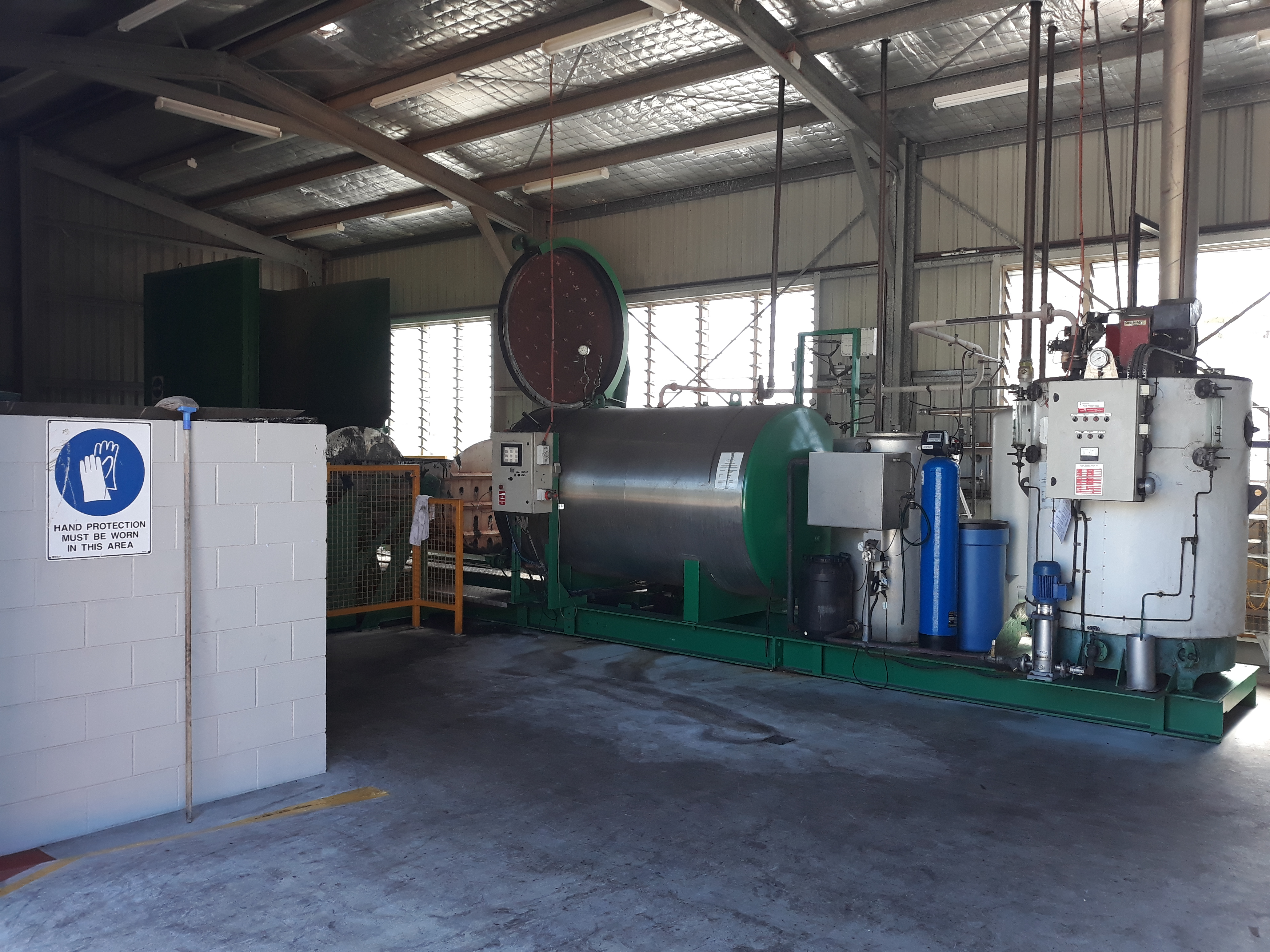
The waste is treated for a specified period at pressures and temperatures under Commonwealth Approved Arrangements (DAWE) and State Environmental Authority (DES) requirements.
The Port of Abbot Point and Port of Weipa do not have the facilities to treat biosecurity waste, and no such waste is accepted.
Contact
If you require quarantine waste removal services, please contact JJ Richards on (07) 4952 3555.
Invasive Marine pest Monitoring
We have a series of settlement arrays/plates installed at each of our four Ports and Invasive Marine Pest (IMP) monitoring is undertaken by our staff on a quarterly basis.
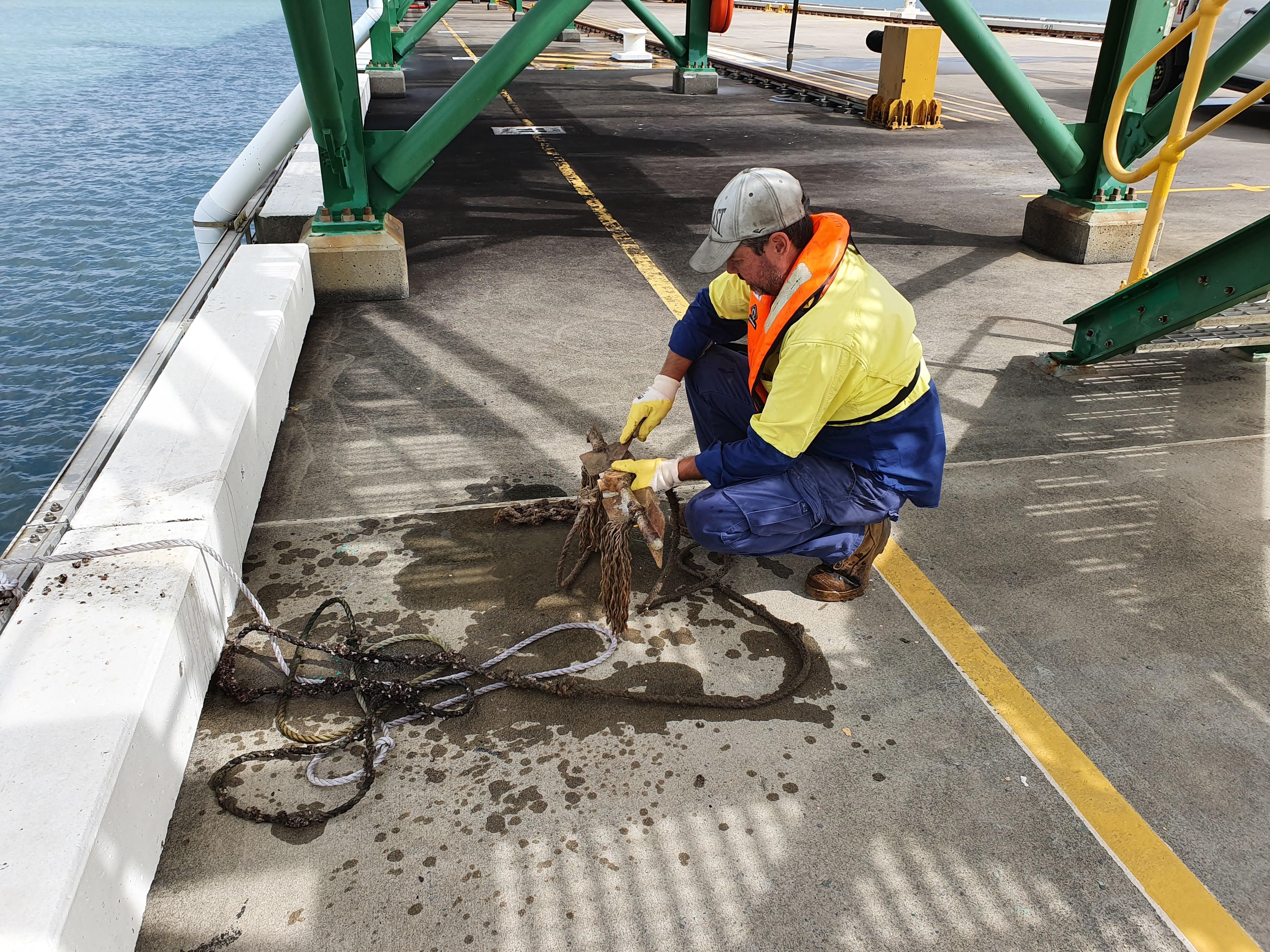
These devices act as an early warning detection system and are located close to marine infrastructure, including berths.
The plates are visually assessed and, as required, sent for analysis. We work closely with State and Commonwealth Departments to ensure the monitoring program maintains current best practice.
Recent improvements to the program have included the risk-based incorporation of plankton tows and eDNA analysis.
Go to the Queensland Government website to read further information, including a list of invasive pest species with the highest chance of arriving and establishing in Queensland.
Hitchhiker pests
Hitchhiker Pests are pests, diseases and/or weed species that arrive in Australia unintentionally by hitching a ride on vessels or cargo from overseas.
Common hitchhiker pests include ants, lizards, bees, snakes, frogs, snails and even feral animals. If these species establish in Australia, they can wipe out agricultural food crops, outcompete native flora and fauna species and can even have an impact on human health.
When working around ports, international vessels or cargo, keep your eyes out for:
- live or dead animals
- holes in timber pallets as it may signify borer activity
- mosquito activity around pooled water
- organic matter – plant, soil, mud or even animal faeces
There are thousands of hiding places on vessels and break-bulk cargo for hitchhiker pests to hide. Go to the Department of Agriculture, Water and the Environment website to see images of plant pests and diseases.
Report a pest
If you see evidence of hitchhiker pests, ensure you secure the area and report the incident immediately to our Environment Team via email environment@nqbp.com.au
Otherwise you can report via the Department of Agriculture, Water and the Environment’s See, Secure, Report Hotline on 1800 798 636 or the Department of Agriculture and Fisheries' Look. Report. Protect service on 13 25 23.
Bee monitoring
We monitor for invasive bees and bee-related biosecurity issues through a number of bee boxes situated just outside the secure port area at the Port of Mackay. These bee boxes form part of the National Bee Pest Surveillance Program administered by Department of Agriculture and Fisheries (DAF) on behalf of Department of Agriculture, Water and the Environment (DAWE).
The program aims to provide an early detection response for any exotic bees (ie Asian Honey Bee) that may unintentionally be brought to Australia on international vessels or cargo.
An invasive bee species or bee related disease could be devastating for the local honey industry and local bee populations.
Four bee boxes were installed on NQBP land at the Port of Mackay in early 2019 and a recent extension in the program has seen an additional four bee boxes installed in February 2020.
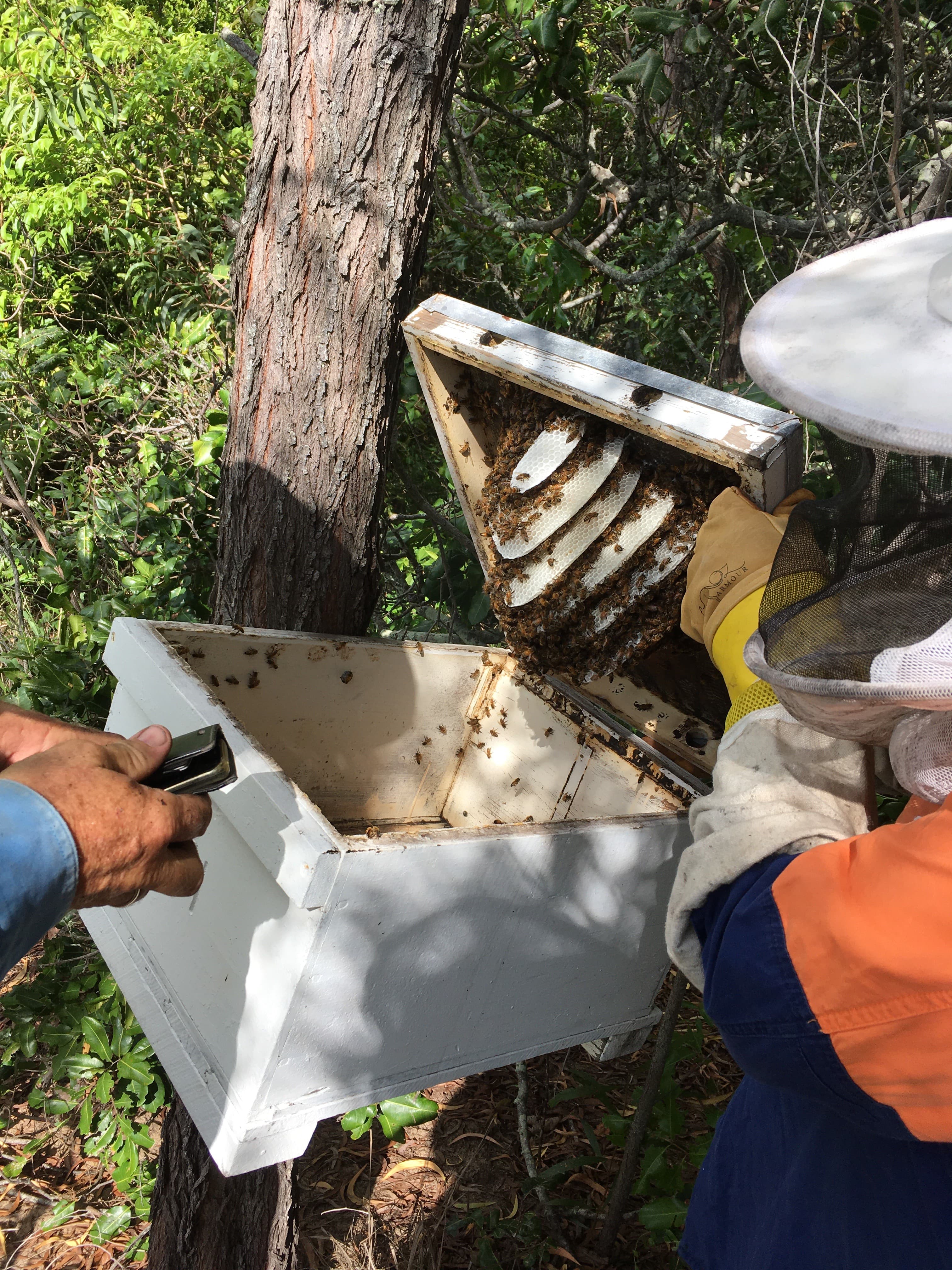
We monitor the eight boxes on a six-weekly basis with findings reported to the DAF Biosecurity Unit.
Bees have been found occupying the boxes on two occasions since their installation, however analysis of the colonies showed these to be the native bee species.
Invasive exotic ant monitoring
We partner with Biosecurity Queensland to conduct surveillance for invasive exotic ants and ant-related biosecurity issues at our Port of Mackay.
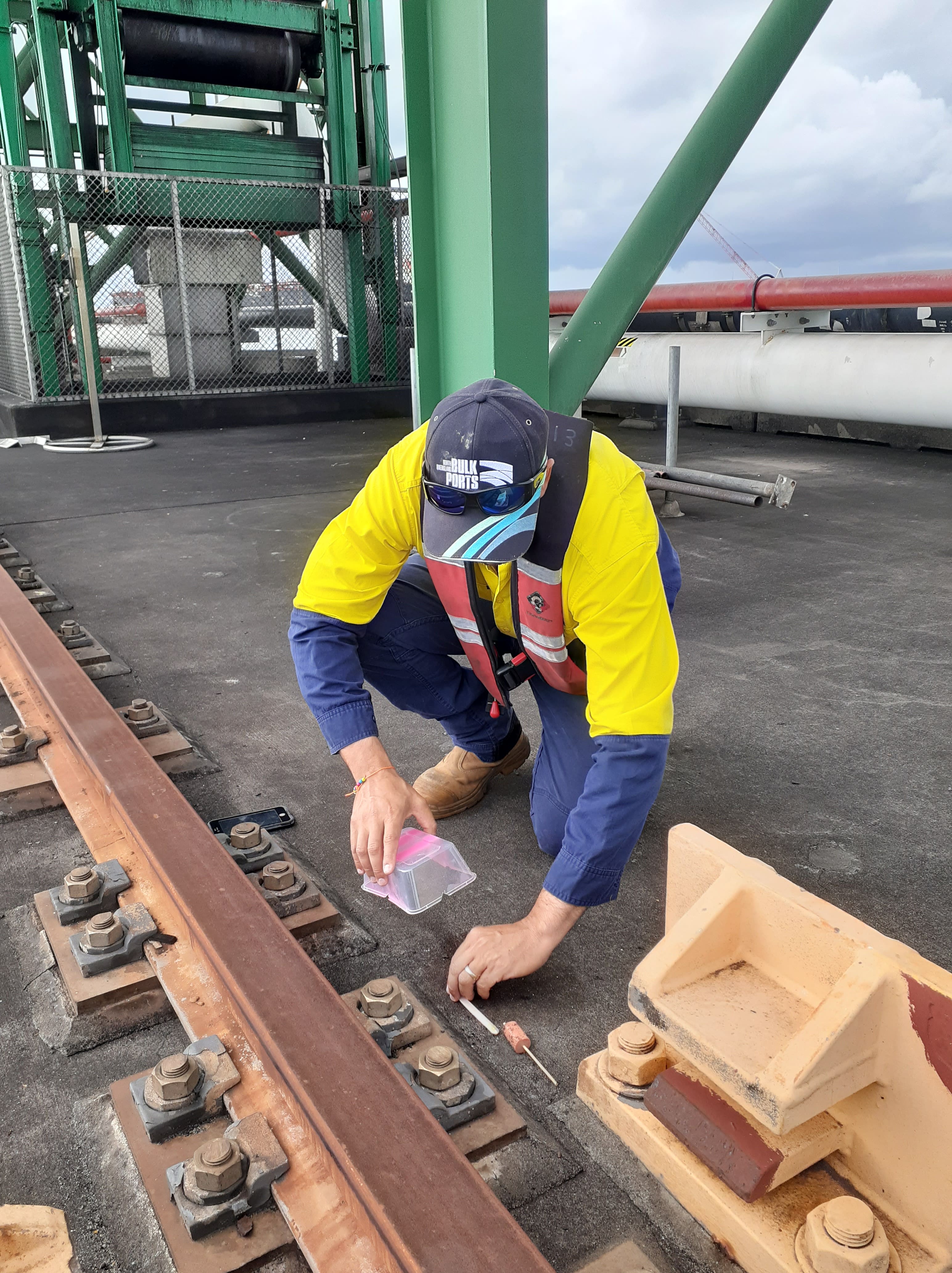
Invasive exotic ant species (Yellow Crazy Ants, Fire Ants, Electric Ants etc) or ant-related disease could be devastating for local flora and fauna; agricultural/horticultural industries, potentially affecting future trade opportunities.
Our Port of Mackay is a multi-cargo port, with potentially higher risk to hitchhiker pests.
Our invasive exotic ant surveillance program, added to existing programs in December 2020, is completed quarterly.
Invasive Marine Pests (IMPs) can be introduced to new environments by ships, mainly through ballast water or hull fouling.
Ballast Water management
Ballast water is held in tanks and cargo holds of ships in order to increase a ships navigability, stability and manoeuvrability during transit.
IMPs potentially carried in a ship's ballast water can pose serious ecological, economic and health problems. Bacteria, microbes, small invertebrates, algae, eggs, cysts and larvae of various species are examples of organisms that can be transferred via ballast water discharge.
The Biosecurity Act 2015 and Australian Ballast Water Management Requirements collectively explain how ballast water should be managed within Australia.
Ships obligations must include:
- Managing ballast water prior to arrival in Australian seas, and between Australian ports
- Carrying a ballast water management plan, certificate and maintain ballast water records
Regulatory changes since 8 September 2019, states all vessels that use ballast water must meet the regulation D2 discharge standard of the International Convention for the Control and Management of Ships’ Ballast Water and Sediments at their next renewal survey.
Discharge of ballast water needs to be compliant as per Australian ballast water management requirements which are available on the Department of Agriculture, Water and the Environment (DAWE) website.
Biofouling
Biofouling (biological fouling) is the undesirable accumulation of microorganisms, plants, algae and animals on submerged structures such as ships’ hulls but also on static marine infrastructure.
Biofouling can be a significant vector for the transfer of invasive marines species which may pose threats to a range of factors including but not limited to human health, biodiversity values, fisheries as well as the economy.
Managing vessel biofouling not only helps to reduce the risk of invasive marine pests entering new waters, but also helps improve vessel performance and efficiency through reduced fuel usage and reduced ongoing maintenance costs.
Biofouling management and guidelines for commercial, non-trading and recreational vessels can be found at the DAWE website.
Inwater cleaning is not allowed unless Department of Agriculture, Water and the Environment approves that compliance can be shown against the anti-fouling and in-water cleaning guidelines.
NOTE: We do not allow:
- ballast water exchange
- or hull cleaning
Ballast water must be exchanged outside of the great Barrier Reef World Heritage Area on entry to allow for berthing activities at Port.
We do not allow in-water hull cleaning within Port limits. Applications to DAWE may be made for exceptions to this.
We uphold a General Biosecurity Obligation (GBO) on strategic port land.
Port Service Workers conduct routine and regular weed maintenance in the built environment. Specialised weed management contractors undertake more intensive weed removal and maintenance works required in the large portions of reserve land and natural areas under our ownership. This includes works in bushland, dune/beach systems or melaleuca forest such as that pictured below at the Kommo Toera Trail in Mackay.
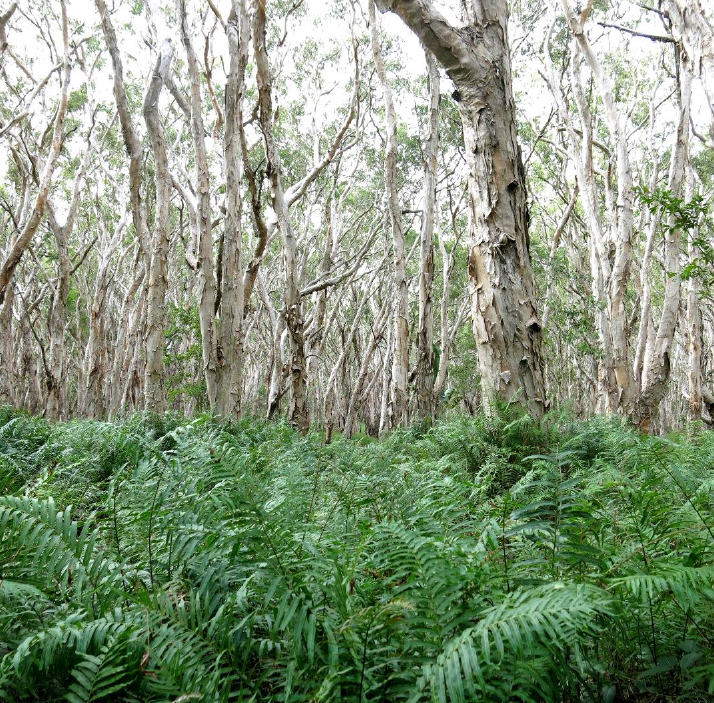
Many of these natural areas have Weed Management Plans (inclusive of comprehensive weed mapping) identifying weed species for the land, setting targets and guiding priority weed removal and ongoing maintenance works on ground.
In some instances, we may restrict public access to some of the natural areas within port land. This may be for security reasons but to minimise weed infiltration unintentionally brought in via vehicle movements or from members of the public and pets.
If you notice any Declared weeds on NQBP land, please report to environment@nqbp.com.au
The Biosecurity Amendment (Biofouling Management) Regulations 2021 (biofouling regulations) entered into force on 15 June 2022. This requires operators of all vessels to provide information on biofouling management practices prior to arriving in Australia.
The Australian biofouling management requirements provide details of Australia’s pre-arrival reporting requirements and guidance for operators of international vessels that are subject to biosecurity control while in Australian territorial seas. The Australian biofouling management requirements are now available at Managing biofouling in Australia.
The department’s Maritime Arrivals Reporting System (MARS) pre-arrival report (PAR) will include mandatory questions relating to biofouling management practices.
The biofouling questions on the pre-arrival report will include:
- Does the vessel have an effective biofouling management plan?
- Has the vessel been cleaned of all biofouling within 30 days of arriving in Australia?
- Does the vessel have an alternative biofouling management method that has been pre-approved by the department?
- Do you intend to in-water (underwater) clean biofouling in Australia?
Vessel operators can demonstrate proactive management of biofouling by implementing one of the 3 accepted proactive biofouling management options:
- Implementation of an effective biofouling management plan; or
- Cleaned all biofouling within 30 days prior to arriving in Australian territory; or
- Implementation of an alternative biofouling management method pre-approved by the department.
Documentary evidence must be available upon request by a departmental officer.
Vessel operators that cannot demonstrate implementation of proactive management practices will be asked additional pre-arrival questions. The department will use responses to inform assessments of the biosecurity risk associated with biofouling on vessels. The department may also conduct inspections of submerged hulls and niche areas to inform assessments of whether the vessels present an unacceptable biosecurity risk associated with biofouling.
The department will be taking an education-first approach to enforcing the new requirements between 15 June 2022 and 15 December 2023. During this period the department will be focussing on providing education and advice to ship managers with the aim of minimising unintentionally incorrect pre-arrival reporting. The department will also be working with ship managers to improve the effectiveness of biofouling management plans.
